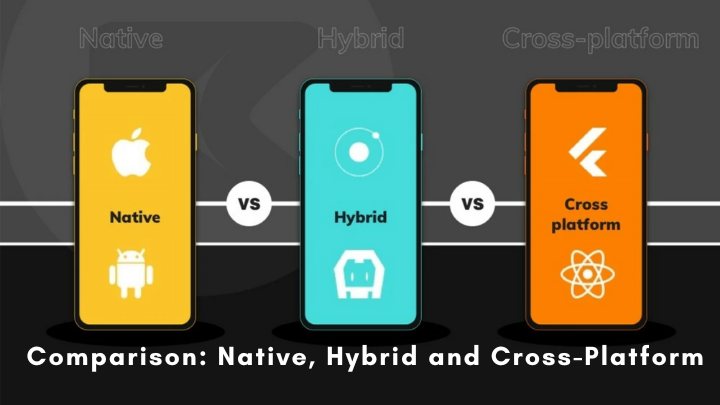
Mobile app development is the process of creating software applications that run on a mobile device, such as a smartphone or tablet. These apps can be designed for various purposes, including gaming, productivity, social networking, and more. The process of developing a mobile app involves a combination of coding, design, and testing, and can be done by individuals or teams of developers. One of the biggest challenge and first question to tackle is the which method to go for: native, hybrid or cross-platform app development.
With the increasing popularity of smartphones and the proliferation of mobile app stores, mobile app development has become a vital and growing industry. There are number of available platforms including iOS, Android, Windows Phone, and more. In this article, we will discuss some of important factors to consider. But, before going ahead, first understand the differences between all three categories.
What is Native app development?
Native app development refers to building an app specifically for a particular mobile operating system, such as iOS or Android. These apps are typically built using the native programming language of the platform, such as Swift for iOS or Java for Android. They have access to all the features of the device and tend to provide the best performance and user experience. However, developing a native app for multiple platforms can be costly and time-consuming.
What is Hybrid app development?
Hybrid app development refers to building an app that combines elements of native and web-based apps. These apps are typically built using web technologies such as HTML, CSS, and JavaScript, and then wrapped in a native container that allows them to run on different platforms. They tend to be quicker and cheaper to develop than native apps, but may not perform as well and may not have access to all the features of the device.
What is Cross-platform development?
Cross-platform app development refers to building an app that can run on multiple platforms using a single codebase. This is achieved using technologies such as React Native, Xamarin, and Flutter. These apps tend to be quicker and cheaper to develop than native apps and can provide a consistent user experience across different platforms. However, they may not perform as well as native apps and may not have access to all the features of the device.

1. Performance
When it comes to mobile apps, performance and user experience are two of the most important factors to consider. The performance of an app depends on the development framework and platform. Generally, native apps are faster, more secure and offer better user experiences than hybrid and cross-platform apps. However, both options are capable of performing well.
While hybrid and cross-platform apps have their own advantages, the choice is ultimately dependent on your business goals. If you’re looking to build an application with high performance and a short development lifecycle, native development is likely your best bet.
Native applications are built for a particular operating system (OS) and can provide better interoperability with other native apps. In addition, they also have more access to the OS’s core capabilities.
2. Time to market
A key factor that is crucial to choosing the right app development approach is time to market. Each mobile app project is different and requires a different strategy. Depending on your budget and talent, you can select the best app development approach for your business.
If you are a startup, then you need to prioritize speed to market. Your goal is to be competitive in the mobile market, so you want to be able to deliver apps to users as quickly as possible. However, you need to make sure that you do not frustrate your user’s UX expectations.
There are two major app development approaches: native and hybrid. Both have their own advantages and disadvantages. To make a well-informed decision, you need to understand what the benefits and disadvantages are of each.
3. Development costs
When it comes to developing mobile apps, there are three options available: native, hybrid, and cross-platform. Each of them has its own advantages, but each has its own development costs as well. It is important to decide which one is the best fit for your project.
The main advantage of native apps is that they offer better user experience (UX) and performance. However, these applications are more expensive than hybrid and cross-platform apps. They also require a longer development lifecycle.
Hybrid apps are a mixture of native and web solutions. Unlike native apps, hybrid apps are built on frameworks and plugins, and they tend to have slower performance. But they are a more affordable option for startups that don’t have a high budget.
Cross-platform development is the most cost-effective way to create custom applications. Using a framework to develop a product for multiple platforms at once is a great way to reduce development costs and time. In addition, the use of libraries and frameworks allows the developer to deliver a near-native UI.
4. App security
In the era of digital transformation, many organizations find it hard to choose the best app development approach. Whether it is native vs hybrid vs cross-platform or a combination of the three, choosing the best technology is crucial. The application type and functionality are also important factors to consider.
As users become more demanding, the need for personalization increases. Brands should focus on enhancing usability first. When choosing between hybrid vs native vs cross-platform, it’s important to understand how each technology works. Hybrid apps allow for easy customization, but tend to be slower. Cross-platform frameworks also reduce the development time and cost.
Compared to cross-platform and hybrid applications, native apps offer the best user experience and security. They allow for access to the native UI layouts and controls, as well as device features. These applications are able to implement sophisticated fraud detection systems and file encryption.
5. Customization & UX
There are different approaches to app development. The approach you choose depends on the project, the target audience, and the budget. If you are looking for a cost-effective, high-quality application, cross-platform app development is the way to go. But if you want to offer personalized experiences, and you have a larger budget, native app development may be the best choice.
Cross-platform apps are developed on one platform and then shared between other platforms. They can be downloaded from the respective OS. However, they do not have the same level of performance as a native application. This is because they rely on a special bridge to connect the web code to the native components.
Hybrid applications, on the other hand, are made with a web development language like JS or HTML. These are then inserted into a native container. The user interface is provided by a native viewer and the rest of the app’s functionality is handled by a native framework.

Comparison
So, in a nut shell, given below are the major takeaway from comparison of native, hybrid and cross-platform app development.
- While native app development provides the best performance and user experience, it is also the most expensive and time-consuming.
- Hybrid and cross-platform development provide a more cost-effective and time-efficient option, but may not provide the same level of performance and access to device features as native apps.
In conclusion, the cross-platform development process is huge and complex as it includes a combination of coding, design, and testing. Whether you’re an individual developer or part of a team, understanding all the above mentioned parameters will help you create high-quality apps. Such background work is essential to meet the needs of users and stand out in a crowded market.
The choice of approach depends on the specific requirements and constraints of the project. So, it is not one-size-fits-all. Decide the one as per the client and go ahead.
